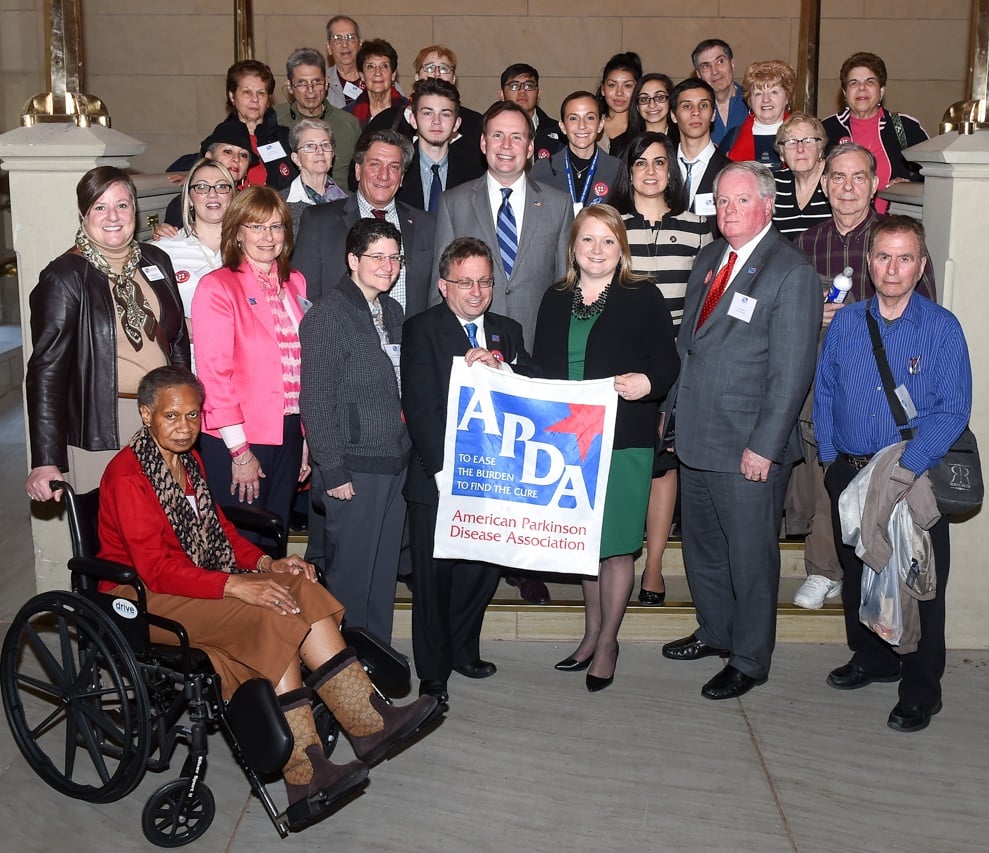NY STATE DECLARES APRIL AS PARKINSON’S DISEASE AWARENESS MONTH
American Parkinson Disease Association Works With State Assembly to Pass Resolution
New York, NY, April 6, 2016 — A resolution sponsored by Assemblywoman Addie J. Russell (D-Theresa) calling on Gov. Andrew M. Cuomo to declare April as Parkinson’s Disease Awareness Month in New York State passed the state Assembly yesterday.
“The disease has received considerable attention in recent years through the courage of activists at every level. Many of our friends and neighbors in Jefferson and St. Lawrence counties and across the state are facing challenges, physically, emotionally, and financially, due to this illness,” Russell said.
She pointed out that one million American’s have been diagnosed with Parkinson’s disease (PD) and a new diagnosis is made every nine minutes in the United States alone.
The American Parkinson Disease Association (APDA) with headquarters based in Staten Island, NY, traveled to the State Capitol yesterday with a group of 30 local members of the Parkinson disease community including students from Susan E. Wagner High School, APDA Board Members Thomas K. Penett, Esq. and Mario J. Esposito Jr., people living with Parkinson’s Disease and their care partners, and APDA national staff. The resolution was passed with a unanimous vote from the Assembly, with particular support from local Staten Island Assemblymembers Matthew Titone, Nicole Malliotakis and Michael Cusick who spoke on behalf of APDA and the importance of this resolution.
Assemblywoman Russell has sponsored the resolution each year since 2012. The American Parkinson Disease Association has been working with Assemblywoman Russell’s team this year to show support for this resolution. APDA President and CEO, Leslie A. Chambers, states “This resolution will bring additional attention to Parkinson’s Disease and encourage more people to get involved. We are incredibly thankful for Assemblywoman Russell’s dedication to this cause.”
APDA at NY State Capitol. Front row standing L-R: Stephanie Paul, APDA VP; Leslie A. Chambers, APDA President & CEO; Rachael Monaco, Susan E. Wagner High School; Mario J. Esposito Jr., APDA Board Member; Assemblywoman Addie J. Russell; Thomas K. Penett Esq., APDA Board Member; John Fiore, Parkinson’s Disease Support Group Member. 2nd row center L-R: Assemblymembers Matthew Titone, Michael Cusick and Nicole Malliotakis Remaining: Parkinson’s Disease support group members, APDA staff
“People from all walks of life are at risk of developing Parkinson’s disease for reasons we do not yet fully understand,” Russell said. “That’s why I am so supportive of the on-going efforts by the Parkinson’s disease community to identify the causes of Parkinson’s disease and find a cure.”
Parkinson’s Disease Awareness Month is aimed at putting the spotlight on the debilitating disease to help finding better ways to prevent and detect the progressive neurological condition, providing effective care for the disease and ultimately finding a cure.
For more than 50 years, APDA has led the charge as the nation’s largest grassroots organization serving the needs of those touched by Parkinson’s. “While we work tirelessly to help people living with Parkinson’s Disease today, giving them access to the tools, support and treatments they need to have the best quality of life possible, we are also keenly focused on the future as we fund critical Parkinson’s Disease research,” states Chambers. She continues “According to a research article published by the International Parkinson and Movement Disorder Society1, as the size and proportion of the elderly population continues to grow, the societal and economic burden of this disease could double by 2040, which is staggering the think about. For this and so many other reasons, we are deeply committed to putting an end to PD.”
Parkinson’s is characterized by motor problems including slowness of movement, rigidity, and tremor. Balance and gait problems may occur later in the course of illness. Some people may also experience a decrease in facial expression, low voice volume, small handwriting, and difficulty with fine motor movements. A number of non-motor symptoms are associated with Parkinson’s including depression and other emotional changes; difficulty in swallowing, chewing, and speaking; urinary problems or constipation; skin problems; and sleep disruptions. The effects of Parkinson’s disease are different for every person. There is no diagnostic test or biological marker that confirms the diagnosis, and there is currently no cure.
The average age of onset is 60 years old, however approximately 10% of people living with Parkinson’s Disease are under 50. The disease strikes 1.5 times more men than women.
“It is critical to continue the fight to improve awareness and search for a cure for Parkinson’s disease. While we know symptoms of the disease are unique to each person, it can result in pronounced symptoms that seriously impact quality of life for patients, particularly in the latter stages of the disease,” Russell said.
The American Parkinson Disease Association (APDA) is the largest grassroots network dedicated to fighting Parkinson’s disease (PD) and works tirelessly to assist the more than 1 million Americans with PD live life to the fullest in the face of this chronic, neurological disorder. Founded in 1961, APDA has raised and invested more than $170 million to provide outstanding patient services and educational programs, elevate public awareness about the disease, and support research designed to unlock the mysteries of PD and ultimately put an end to this disease.
# # #
1 Kowal, S. L., Dall, T. M., Chakrabarti, R., Storm, M. V. and Jain, A. (2013), The current and projected economic burden of Parkinson’s disease in the United States. Mov. Disord., 28: 311–318. doi: 10.1002/mds.25292
Contact
Eloise Caggiano

